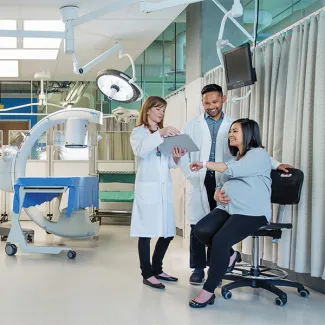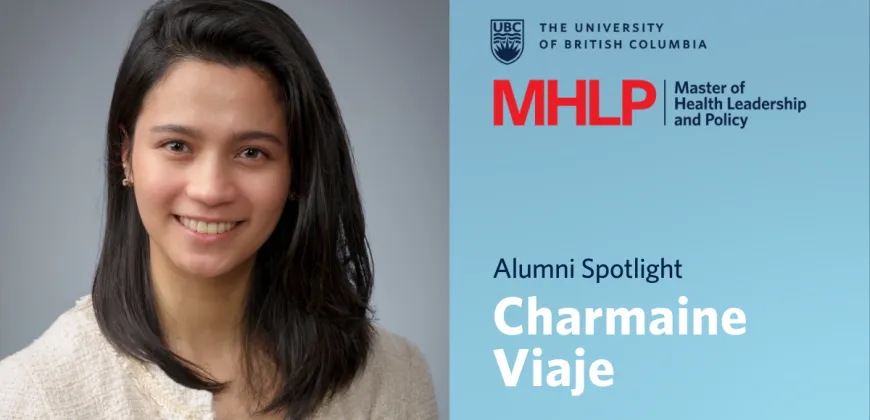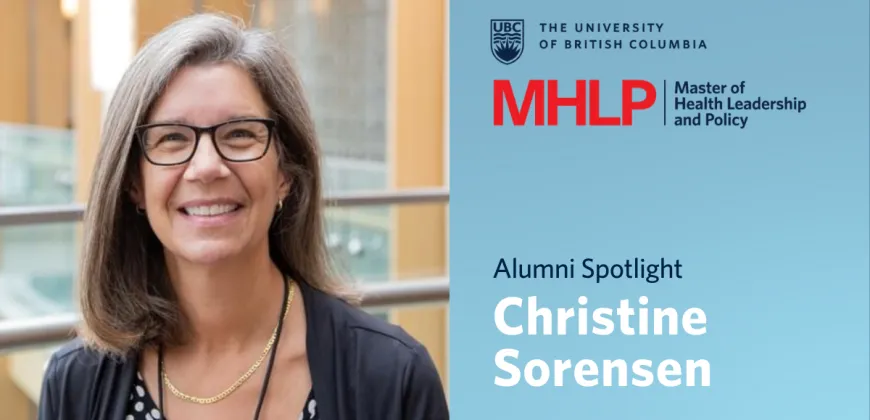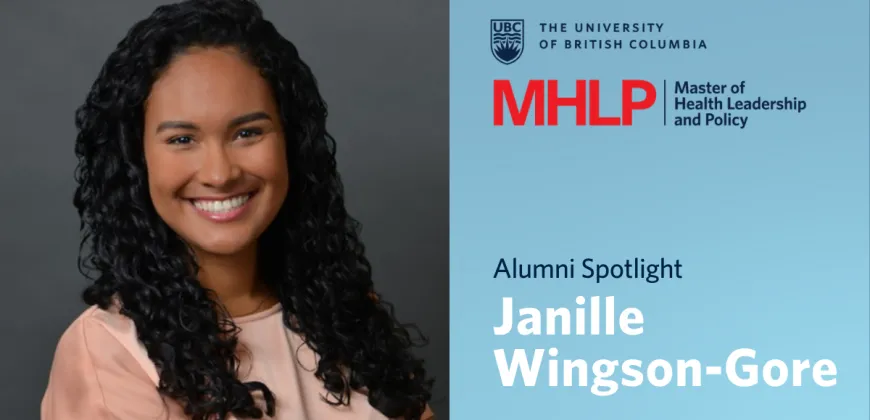Alumni Spotlight: Lisa Jang
In 2025, Lisa Jang received the New Graduate Champion Award from the national organization Nursing the Future for her “leadership, mentorship and innovation as a nurse educator with PHSA.” Read about the program she’s leading and how the MHLP helped prepare her for her role.
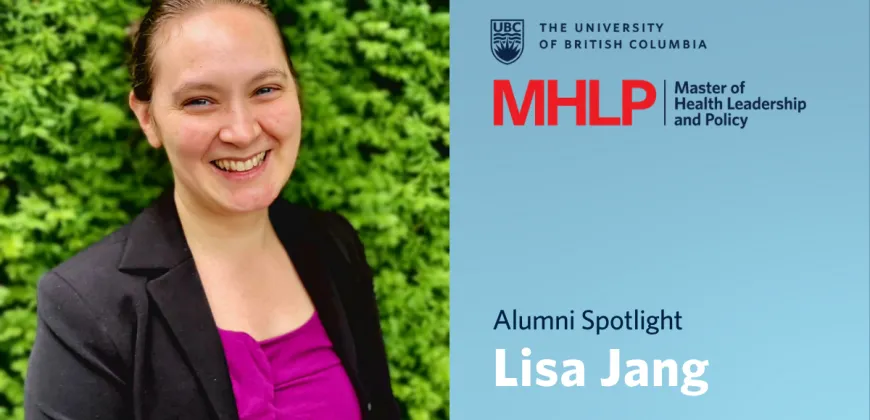
According to the vice president of the BC Nurses’ Union, nurses in BC have a five-year attrition rate of around 50 per cent. Lisa Jang is hoping to change that number.
A graduate of the Master of Health Leadership and Policy in Clinical Education in 2022, Lisa is leading the Provincial Health Services Authority’s New Graduate Transition to Practice program that provides mentorship, online support, workshops and more.
“The PHSA Roots Program focuses on ways to support new nursing and allied health graduates as they make the transition from school to the workplace,” she says. “We know retaining new hires is a challenge, with many leaving after only a short time in practice.”
Shortly after completing the MHLP, Lisa was honoured to join PHSA to support new graduates as they begin their careers across the organization. Collaborating with PHSA leadership, Diversity, Equity, and Inclusion teams, and Learning & Development, she led a full redesign of the program, grounding it deeply in Coast Salish teachings.
These teachings serve as the foundation for PHSA Roots, a flexible and evidence-informed framework that supports diverse PHSA programs—including BC Women’s and Children’s Hospital, BC Cancer, BC Emergency Health Services, BC Mental Health & Substance Use Services, and BC Centre for Disease Control—helping each foster environments of understanding, respect and healing.
PHSA Roots: Providing wholistic support for new graduates
At the heart of PHSA Roots is a shared connection to nature. The Western Red Cedar is known in many Coast Salish communities as the Tree of Life, symbolizing strength, generosity and healing. This symbol, along with the six Coast Salish teachings that guide the program’s core values, inspired the name “PHSA Roots.” The framework embraces Two-Eyed Seeing, intentionally weaving together Indigenous and Western knowledge systems to create a more wholistic learning experience. This approach reflects PHSA’s commitment to reconciliation by fostering spaces where new graduates can take root, grow, and be nurtured within a community dedicated to cultural humility, collaboration and collective care.
Through storytelling, interprofessional learning and trauma-informed practices, PHSA Roots prioritizes connection and community—recognizing that healing and growth happen best when we learn and care together.
“We wanted to create an equitable program with a curriculum that would be relevant to all the sites and locations across the province,” says Lisa. “This was envisioned as program where we could provide better resources and tools to the educators and mentors already doing great work within existing networks while also giving them the freedom to adapt the program to their sites.”
Lisa spent months revising a legacy curriculum and developing the program. She took inspiration from the knowledge she’d acquired as an MHLP student, the research of Judy Duchsher on the transition to practice and Indigenous ways of knowing.
Workshops and opportunities to share stories and support
The five facilitated workshops that form the backbone of the program support new hires as they make the transition from post-secondary education to practice.
The first workshop, for example, focuses on finding connection, weaving in the Coast Salish concept of nuts a maht (“we are one”) to normalize the challenges new grads are facing, reinforce a growth mindset and help build vital peer connections and a sense of belonging.
The remaining workshops explore wholistic thinking and building team connections, finding collaboration in conflict, health and growth through adversity, and developing a growth mindset and reciprocity in leadership.
The entire cycle of workshops is designed to be taken within 12 to 18 months of starting a position as a new graduate. The final workshop in the series brings it all full circle, encouraging participants to reflect on the next steps of their professional growth, including how they can give back to others just starting their journey as health-care professionals.
PHSA Roots is much more than workshops. Lisa develops e-newsletters that explore different topics – everything from practical information on how to get reimbursed for licensing fees to profiling upcoming guest speakers sharing insights on mental health and strategies to make shift work more manageable.
Lisa is particularly excited about the SharePoint site, which in addition to offering a range of resources has created a vibrant community of practice where people share their experiences.
“My favourite part of this site is the grad stories,” she says. “People who have completed the first workshop are invited to share their stories about how they are feeling a few months into their job. These stories bring me back to how I struggled as a new grad! And then we invite those who have finished the workshop series to reply. It’s such a supportive and inspiring community. I am hoping that these things we’re doing will make a difference and encourage more nurses and allied professionals to continue on in their careers.”
From marketing professional to perioperative nurse to nurse educator
Lisa began her career in a completely different field than health care, initially completing a diploma in direct marketing/communications from BCIT. But having “worked for ages as a lifeguard and loving first aid and the action side of things” she realized that marketing wasn’t quite the right fit for her interests and passions. So she completed a degree in nursing and then worked in the fast-paced environment of operating rooms as a perioperative nurse.
Over the course of her more than 10-year career in nursing she took on a variety of other roles, from clinical educator to head nurse and co-ordinator.
“I really fell in love with these leadership roles and doing whatever I could to ensure my team had the support they needed to grow,” she says.
Recognizing that a master’s degree is a requirement for many leadership positions in health care, Lisa explored her options and chose the MHLP in Clinical Education.
“The real appeal was that it incorporated both the health-care side along with the business elements that I enjoyed from my initial background in marketing,” she says. “Another big draw was that it is a one-year program.”
Looking back on the experience, Lisa states that one of the most valuable elements of the degree was that it forced her to “slow down and take the time to reflect.” As she acknowledges, health care is a fast-paced environment (particularly when you are working in an operating room!) that focuses on efficiency and getting things done.
“But faster is not always the healthiest or better approach,” she says. “The clinical education courses emphasized the importance of psychological safety and opened by eyes to Indigenous ways of knowing that I had had very limited exposure to prior to this.”
About 40 percent of the MHLP courses are taught through UBC Sauder’s Robert H. Lee Graduate School of Business, with students taking these courses alongside engineering students in the Master of Engineering Leadership.
She says that the courses on leadership and organizational behaviour helped her consider different styles of leadership and develop strategies how to build a cohesive team.
That emphasis on team-building and leadership has been crucial to Lisa’s work on the PHSA Roots Program, and she is quick to acknowledge the contributions of the “incredible people” she works with – including two MHLP grads, Fairouz Devji and Ellison Chung.
“The connections you make in this program are beyond measure,” she says. “MHLP graduates have the skills to really make an impact in their work – which ultimately is all about helping our patients get the best care possible.”
